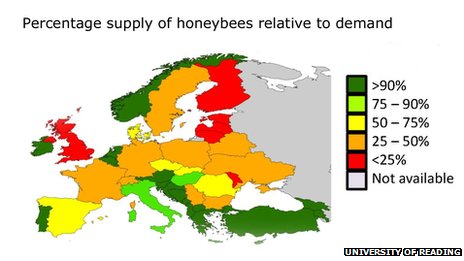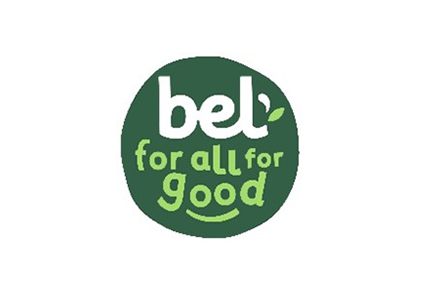Honeybee shortage threatens crop pollination in Europe
9th January 2014
In more than half of European countries, there are not enough honeybees to pollinate crops, according to new research.
Scientists believe that a boom in biofuels has sparked a massive increase in the need for pollination.
The shortage is particularly acute in Britain which has only a quarter of the honeybees required.
Researchers believe that wild pollinators including bumblebees and hoverflies are making up the shortfall.
The study is published in the journal Plos One.
Food for fuel
The number of honeybees in the UK and elsewhere has been in decline in recent years, with both pesticide use and disease being blamed for losses.
Across Europe though, overall numbers of honeybee colonies increased by 7% across 41 countries between 2005 and 2010.
But in the same period, the area of biofuel feed crops, like oilseed rape, sunflowers and soybeans, increased by almost a third.
“There have been big increases in lots of countries with oilseed rape,” said lead author Dr Tom Breeze from the University of Reading.
“In Greece in 2005, there were a few hundred hectares grown, but since then it has exploded because they can get biofuel subsidies for it.”

The scientist say that the deficit across Europe now amounts to 13.4 million colonies or around seven billion honeybees.
The research suggests that much of the work is now being done by wild pollinators including bumblebees, solitary bees and hoverflies.
Britain is one of the countries with the biggest shortfall – only Moldova, with an economy 300 times smaller than the UK, has a bigger honeybee shortage.
Little is known about the number of wild pollinating species as they are not being monitored in the UK. The researchers believe this reliance on them could be hampering yields and putting UK crops at risk.
“We face a catastrophe in future years unless we act now,” said Prof Simon Potts, from the University of Reading, a co-author on the paper.
“Wild pollinators need greater protection. They are the unsung heroes of the countryside, providing a critical link in the food chain for humans and doing work for free that would otherwise cost British farmers £1.8b to replace.”
While steps have been taken at the EU level to protect bees by introducing a moratorium on neonicotinoid pesticides, the researchers say other European legislation is exacerbating the pollinator shortage.
Under the EU renewable fuel directive, 10% of transport fuel must come from renewable sources by 2020, though the final figure is still being negotiated.
Whatever the ultimate target, the directive has seen large increases in the planting of oil crops including soybeans, oil palm as well as oilseed rape.
“There is a growing disconnection between agricultural and environmental policies across Europe,” said Prof Potts.
“Farmers are encouraged to grow oil crops, yet there is not enough joined-up thinking about how to help the insects that will pollinate them.
“We need a proper strategy across Europe to conserve wild bees and pollinators through habitat protection, agricultural policy and farming methods – or we risk big financial losses to the farming sector and a potential food security crisis.”
By Matt McGrath Environment correspondent, BBC News.


